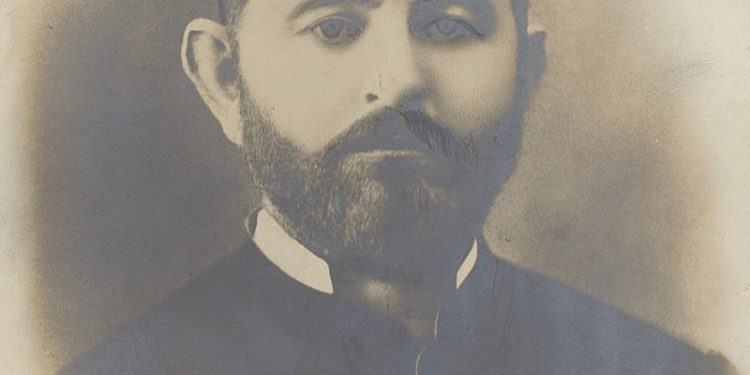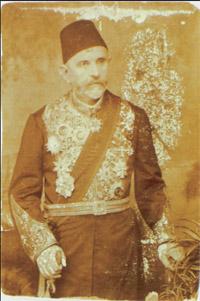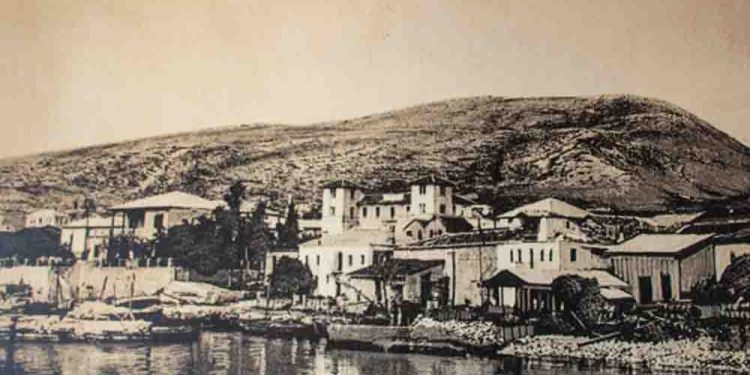By Eugen Shehu
Memorie.al / Born in the distant year 1838, Abedini was very young when the revolts against the Tanzimat reforms started in Çameri and Labëri. Later, he would always experience these revolts through the impressions and memories of his father, Ahmet Dino, who at that time, in his fifties, was at the head of popular revolts. In these revolts, many economic sanctions were rejected that burdened the life of the backward Albanian peasant, making his future fate even darker. Because he raised hundreds of men in Preveza and its surroundings, because he connected with the main leaders of the revolt in Labëri and all the way to Mallakastër, Ahmet Dino would be called to Istanbul, to give an account.
However, only the honesty and the good name he enjoyed in the entire Çameria vilayet saved him from punishment. But still, the High Gate could not let him go home. Ahmet Dino will be exiled to the distant city of Konje, in Anatolia, where he died. What did the brave and wise old man leave to his sons, Veseli and Abedin?
The time that followed, like those cold parts of Cameria, proved that besides the others, apart from the big house and lands, first of all, the wise old man left his sons the great trust for Cameria, for these completely Albanian lands , but so coveted by the Greeks. Abedin Dino’s whole life grew, matured and flourished within this great bequest.
After graduating with honors from his hometown school in Greek, like many of his peers, Abedini went to the “Zosimea” high school in Ioannina. We must not forget that this gymnasium stood out at that time not only for its pro-Western culture, but also for the dissemination of the ideas of the European Enlightenment.
At the same time, the little boy from Preveza would also learn ancient Greek, Latin, French and Italian there, thus laying the foundations of a fairly solid general culture. But the languages and cultures of the East would not be despised in “Zosimea”. Precisely for this, the knowledge received from Abedin was quite deep.
After successfully completing “Zosimea”, Abedin Dino will study law and economics in Istanbul. His propensity for learning and practicing several languages help him to deepen his knowledge, assimilating as much information as possible from multiple sources. Thus, in the mid-70s of the last century, Abedin was appointed commissar of the first stock exchange in Istanbul’s Galata.
In this role, he carefully directs the financial operations of this stock exchange and stands out both for skillful actions and for benefiting from the most effective theoretical paths in terms of commercial combinations. If we take into account the bureaucracy of the high administration of the Ottoman Gate, we will be more convinced of the values of the economic clerk, Abedin Dino.
The boy from Preveza would always think deeply about Cameria, about that blessed place of ancient Illyria. A democrat by nature, he would always try to find something to pave the way for new reforms in all spheres, be they economic, political or social. They made the “Young Ottomans” movement for themselves.
Invited to its flows, he would feel not only the inspiration to work but also himself so emancipated and cultured at the same time. But this movement, which envisioned a civilized future, was not viewed favorably by the Sultan’s friends. They did what was possible to discover and extinguish this movement, even forcing its leaders to leave.
Even though the movement was extinguished by arrogance, Abedin Dino, together with his Turkish and Albanian friends, tried to revise the ideas of this movement as long as possible in the social opinion of that time. However, in the horizons of Albanian life, something had started to catch fire. Already the desire to speak and write the Albanian language, moreover the light of freedom, was open to the Anatolian obscurantism.
In Istanbul, the “Istanbul Committee” is created with wise and brave Albanian men. In the first ranks of this committee, is Abedini with his brother, Vesel Dinon. Both together, they agitate and work without fear, anticipating great hopes for the future of their elegant Preveza.
Around the “Istanbul Committee”, the most prominent activists of Albanian nationalism gathered. In the evening, they were among the first to understand that Slavic, Bulgarian and Greek nationalism, if it grows and strengthens, naturally becomes dangerous for Albania’s borders. Therefore they should develop their national feeling, always through the message of good neighborliness without going into extreme nationalism.
In these situations, Abedin Dino would always remain far-sighted. He knew how to distinguish Albanian perspectives, opening paths for their faster arrival. However, what makes us think about Abedin Dino’s patriotism is undoubtedly his participation and activity within the Albanian League of Prisoners.
His close cooperation in Istanbul with the Frashri brothers, Abdyli, Sami and Naim, caused the optics of his political influences to expand. He is now clear that this relationship will be a cornerstone for the independence and freedom of all Albanian lands.
Abedini and his brother immediately go to Preveza, sell some property there and with the accumulated gold, they travel all over Albania, in Kosovo and Turkey, doing everything possible to affirm the Albanian national issue. In some of the memorandums addressed to the Great Powers, from the southern Albanian territories, Abedin Dino’s name is the first. It is not difficult to understand that he was their initiator.
He participates in many meetings, acts intensively but always wants to be somewhat withdrawn, not to be popular. So in his state functions, he tried with every means to protect his homeland, Albania.
Thus, at the end of the Russo-Turkish war, when several Greek military formations approached Saranda, he also used his position in the Public Rescue Committee and mobilized thousands of volunteers from Delvina, Vlora and Gjirokastra, thus saving the fragmentation of the Albanian lands.
As for his activity in the Albanian League of Prizren, I think it is worth saying that in every meeting, conversation or assembly of men in Çamëri, where Abdyl Frashëri participated, the opening speech was given by Abedin Dino. Both of them were connected through nationalism, showing not only loyalty to each other but especially love to their homeland. Even the beautiful song of the people, the tombstone song erected in the memory of the nation, says:
“Avdyli with Abedina,
the standing millet is frozen,
from Vlora to Ioannina,
From Skrapari to Florina,
demand autonomy,
for all of Albania…”!
In the years 1877-1880, Abedin Dino was appointed to the office of Governor of Thessaloniki. But even here, his eyes and mind are directed only to Cameri. So in the year 1879, on January 11, he organized the assembly of South Albanian leaders in his house in Preveza.
This assembly determined the concrete measures related to the aspiration of the Albanians for independence. Although he had an important job in Thessaloniki, Abedini did not stop contacting the Frashëri brothers, Ismail Qemalin and other Albanian patriots who had high positions in the Turkish administration of the time.
In June 1880, thanks to his diplomatic skills and ingenuity, Abedin Dino was appointed Foreign Minister of the High Porte. In the numerous and direct contacts with foreign diplomats, rather carefully, the son of Preveza brought up the Albanian issue, its hazy future, in the conversation.
But after a while, this spirit of his patriotism caught the eye of other dignitaries of the empire who did not delay in informing the Sultan about the pronounced Albanian feelings of Minister Abedin Dino.
Meanwhile, several consuls in Istanbul had brought word to the Sultan’s offices about the Albanian Dino. This was the reason that very soon, by special order, the Sultan dismissed him from office, leaving “the Arnaut rebel from Preveza” free.
In the chair of the Foreign Minister of the Ottoman Empire, Abedin Dino, he served the Albanian national issue and, in particular, his beloved Cameri. He discovered in time, before the foreign diplomacy, the annexation intentions of Greece in the Albanian south and interacting with the high leaders of the Albanian League of Prizren, preserved the Albanian lands intact, benefiting from the large extents of the High Gate.
However, what should not be forgotten in these moments of his great power is the fact that in all the conversations with his compatriots, he expressed great sincerity when he said:
“If you see fit, I leave this Istanbul armchair without any worries. I have been and will be happy to come with you and fight in the ranks of the Albanian League of Prisoners, as its simple soldier”.
But his activity for the benefit of the national issue, of course, would conflict with the strict principles of the high Ottoman administration. They will call him several times, reprimanding him in fear, but Abedin Dinua seems to have been “deaf” to these banal fears. Meanwhile, he maintains constant correspondence with Ahmet Xhevdet Pasha, the drafter of the civil code of the Ottoman Empire.
This exchange of letters has more to do with joint consultations in jurisprudence, as in the personality of Abedin Dino, Ahmet Xhevdet Pasha saw not only a deep knowledge of laws but, especially, his far-sightedness in terms of regulating the social life of the empire. within the framework of the civil code.
Even though he was exiled to Jilldis Qoshk, the son of Preveza could not be separated from intellectual work at any moment. He studies without lining up, writes philosophical treatises, researches in linguistics, but also writes genuine literature. What can these works be, how many are there, in which basement of Istanbul they are hidden, these are some puzzles that, if this passing century cannot be solved, let’s hope that they will be solved at the dawn of the new century, for us Albanians.
There may have been a faint ray of hope in Abedin Dino’s heart, when after twenty-five years of exile, he was called by the Sultan to the Royal Court.
It was the year 1905. While waiting to meet the Sultan, in a cafe, Abedin Dino was secretly poisoned. His hopes to see Chameria’s fortunes flourish are ultimately killed. Honest Albanians from Çamërie, Labërie, Shkodër and Kosovo escort their fellow countryman and patriot to the grave, weeping.
Six years later, Dervish Hima, another fatos of Albanian nationalism, publishes the book “Alhqiptari” in Istanbul. In it, they listed a series of Albanian personalities, where Abedin Dinoja undoubtedly took the place he deserved. He described there not only what he gave to Albania but, in the evening, what a great contribution his energies and work released, helping the civilization of the Turkish people.
But how much value Abedin Dino’s life had, the brave people of Cameria can know better. His name, as well as his work, resonate even today in our national consciousness. In this context, I would say that honor and respect for this outstanding patriot lives in every village where Albanian is spoken, where the weight of memory is greater than that of stones. Memorie.al














